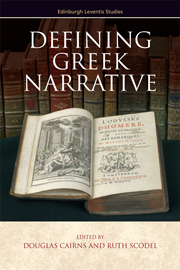Book contents
- Frontmatter
- Contents
- Preface
- Notes on Contributors
- 1 Introduction
- PART I DEFINING THE GREEK TRADITION
- PART II THE DEVELOPMENT OF THE GREEK TRADITION
- 6 Exemplarity and Narrative in the Greek Tradition
- 7 ‘Where do I begin?’: An Odyssean Narrative Strategy and its Afterlife
- 8 Some Ancient Views on Narrative, its Structure and Working
- 9 Who, Sappho?
- 10 The Creative Impact of the Occasion: Pindar's Songs for the Emmenids and Horace's Odes 1.12 and 4.2
- 11 Narrative on the Greek Tragic Stage
- 12 Stock Situations, Topoi and the Greekness of Greek Historiography
- 13 Heliodorus the Hellene
- PART III BEYOND GREECE
- Bibliography
- Index
8 - Some Ancient Views on Narrative, its Structure and Working
from PART II - THE DEVELOPMENT OF THE GREEK TRADITION
Published online by Cambridge University Press: 05 September 2014
- Frontmatter
- Contents
- Preface
- Notes on Contributors
- 1 Introduction
- PART I DEFINING THE GREEK TRADITION
- PART II THE DEVELOPMENT OF THE GREEK TRADITION
- 6 Exemplarity and Narrative in the Greek Tradition
- 7 ‘Where do I begin?’: An Odyssean Narrative Strategy and its Afterlife
- 8 Some Ancient Views on Narrative, its Structure and Working
- 9 Who, Sappho?
- 10 The Creative Impact of the Occasion: Pindar's Songs for the Emmenids and Horace's Odes 1.12 and 4.2
- 11 Narrative on the Greek Tragic Stage
- 12 Stock Situations, Topoi and the Greekness of Greek Historiography
- 13 Heliodorus the Hellene
- PART III BEYOND GREECE
- Bibliography
- Index
Summary
‘The second task required of a writer of an historical work (the first task being to select a suitable subject) is to decide where to begin and how far to go.’ The fundamental questions of ‘where to begin’ and ‘where to end’ must be as old as literature itself. They automatically pose themselves to any would-be poet or author. Moreover, passages such as Od. 9.14 show that, from an early stage, poets openly addressed the questions ‘What then shall I recount first, what last?’ (albeit here in the voice of the character Odysseus at the beginning of his long narrative to the Phaeacians). In all likelihood these questions quickly became a literary topos (possibly before Homer), which in turn could playfully be modified by subsequent poets and authors (cf. Hunter, this volume). They thus prepared the ground for literary critics to treat the whole issue in their analyses. No doubt, they especially needed to address this issue because those compositions which were the earliest extant works and also the undisputed masterpieces of Greek literature, the Homeric epics, displayed a remarkable temporal structure and thus intrigued readers.
- Type
- Chapter
- Information
- Defining Greek Narrative , pp. 156 - 174Publisher: Edinburgh University PressPrint publication year: 2014

